- Home
- Edward Rutherfurd
New York Page 4
New York Read online
Page 4
He knew their customs. Even for a severe fever, an Indian would retire to a little cabin heated with red-hot stones until it was like an oven. Sitting there until he was pouring with sweat, the sick one would emerge, plunge into the cold river, then wrap himself in a blanket and dry out by the fire. The treatment often worked. If not, there were the medicine men, skilled with herbs.
As van Dyck approached the house where she lay, an old man had come out. “Only the meteinu can help her now,” the old fellow said sadly. The meteinu had skills beyond the ordinary medicine men. They communed with the spirit world and knew the secret spells. If they alone could help her, she must be close to death.
“What kind of sickness has she?” van Dyck asked.
“A fever.” The old man seemed uncertain, but grimaced. “Her skin …” He seemed to be indicating pockmarks. He walked quietly away.
Pockmarks. The Dutchman gave a shiver of fear. The greatest curse the White Man had brought to America was disease. Influenza, measles, chickenpox—the common maladies of the Old World, against which the Indians had no resistance. Whole villages had died. Perhaps half the native population of the region had already faded away. Malaria had come with the White Men’s ships, and syphilis too. But the most fearsome import of all had been smallpox. Only last year, that terrible scourge had wiped out nearly a whole tribe south of New Netherland, and then appeared even in New Amsterdam.
Could it be smallpox?
Then he had done a terrible thing. He could explain it, of course. He had to think of himself, his wife and children, the good people of New Amsterdam. The dominie would have told him: consider the greater good. Oh yes, he was justified. He had done the right thing when he hesitated and then, avoiding even Pale Feather, hurried back to his boat, and gone downriver.
But couldn’t he have waited, instead of running like a coward? At a time when her family were preparing to be at her side, he’d deserted his Indian woman. Couldn’t he at least have seen the child? The pain, the awful, cold shame of it, haunted him still. Several times a year he awoke in the middle of the night, crying out at the horror of what he had done.
A month later, he’d returned, to find Pale Feather safe in the bosom of her extended family, and to learn that her mother had died the day after he had fled, not of smallpox, but the measles.
He’d tried to make it up to his daughter. Every year, when her people celebrated the feast of the dead, he had arrived. Normally one did not speak of the dead, but at this yearly feast, it was appropriate to do so, and to pray for their souls. This was what he had been doing for the last few days, before taking Pale Feather downriver.
“Tell me what you remember about me when I was little,” she said.
“We should move on,” he answered, “but I will tell you as we go.”
So they left the glade where the wild strawberries grew, and found the old Indian trail again, and as he rode slowly along, he did his best to call to mind all the little incidents he could remember from her childhood, of days he had spent together with her and her mother; and this seemed to please Pale Feather. After a time, though she was not tired, he put her up on the horse in front of him.
They reached the top of Manhattan well before dusk and camped on high ground above some Indian caves. Wrapping themselves in two blankets, they lay staring up at the sky, which was clear and full of stars.
“Do you know where my mother is now?” she asked him.
“Yes.” He knew what the Indians believed. He pointed his arm along the line of the Milky Way. “Her spirit has traveled along the path of stars to the twelfth heaven. She is with the Maker of all things.”
She was silent for a long time, and he wondered if she were still awake. But then, in a sleepy voice, she said: “I think of you often.”
“I think of you too.”
“If you cannot see me, you can always hear me.”
“Tell me how.”
“When there is a little breeze, listen to the voice of the wind sighing in the pine trees. Then you will hear me.”
“I will listen,” he said.
The next morning they made their way down to the water and found the two Indians with the big canoe. There they parted and Dirk van Dyck went home.
Margaretha van Dyck waited three weeks. It was a Sunday afternoon. Her husband had been reading a story to their children, and Quash the slave boy, in the parlor while she sat in a chair watching. These were the times she liked him best. Their son Jan was thirteen, a strong boy with a mop of brown hair, who admired his father and who wanted to follow in his footsteps. Dirk would take him to the company warehouse, explain the workings of the ships, the ports they called at, and the trade winds their captains had to follow. But Jan also reminded her of her own father. He had less waywardness of spirit than Dirk, more love of the counting house. She thought he’d do well.
They had lost two other children a few years ago to a fever. That had been a terrible blow. But the compensation had been the arrival of little Clara. Fair-haired and blue-eyed, she was now five years old, and looked like an angel. A wonderfully sweet-natured child. Her father adored her.
As for Quash the slave boy, he was coming along very well. He was about the same age as Jan, and had been allowed to play with him when he was younger. He was very good with Clara, too. But Quash knew his place.
And watching her husband contentedly reading to his family, Margaretha thought that perhaps her marriage might still become a very happy one, if she could make some small adjustments.
So after the reading was over and the children had gone to a neighbor’s, and her husband had remarked that he’d need to make another trip upriver soon, she nodded quietly. Then she sprang her trap.
“I was thinking, Dirk, that it’s time you joined a syndicate.”
He looked up quickly, then shrugged.
“Can’t afford it.”
But she knew he was paying attention.
Dirk van Dyck had a talent for the fur business. A quarter-century ago, when the West India Company still monopolized the trade of the port, he would have been a more significant figure. But since then, the economy of New Amsterdam had opened up and expanded hugely; and it was the golden circle of leading families—Beekmans, van Rensselaers, van Cortlandts and a score of others—who formed the syndicates to finance the shipping of tobacco, sugar, slaves and other growing commodities. This was where a man could make a fortune. If he had the price of entry.
“We may have more money than you think,” she said quietly. We: a team, husband and wife. She made it sound as if they shared the money jointly, but they both knew it wasn’t so. When her father had died six months ago, Margaretha had inherited; and under the terms of her prenuptial agreement, her husband had no control over her fortune. Nor had she let him discover how large that fortune was. “I think we could invest a little in a syndicate,” she added.
“There is risk,” he warned.
She knew. Some of the largest investors in the colony were rich widows and wives. She had consulted them all.
“No doubt. But I trust your judgment.” She watched him consider. Had he guessed her plan? Probably. But it was hardly an offer to be refused. He thought, then smiled.
“My dear wife,” he answered in an affectionate voice, “I am honored by your trust and I will do whatever I can for our family.”
It had been the richest woman in the colony, a widow who’d just taken her third young husband, who’d given her the advice. “Don’t rule your husband. But arrange the conditions in which he will make his choices.” It would not take long, Margaretha judged, for van Dyck to get a taste for larger transactions. And for the busy social life that went with them. He’d soon be too occupied in New Amsterdam to go running after Indian women in the wilderness. And once he became accustomed to his new life, he’d also be too afraid of her cutting off the funds, even if he were tempted to stray.
“I shall still need to go upriver,” he remarked.
“Oh?” She frowned.
“I can’t abandon the fur business I have. Not yet, anyway. We still need that income, don’t we?”
She hesitated. Actually, his earnings were useful; and unless she was willing to tell him how much money she really had, his argument was sound. But she saw his game. He was trying to slip off the hook. Damn him.
Did he have a woman out there in the wilderness? Or several? That Indian child, she was sure, had been his. Strictly speaking, he could be in serious trouble. In his passion for moral order, Stuyvesant had actually made it illegal to have sexual relations with Indians. But whatever her feelings, bringing her husband before the governor’s court was hardly going to solve anything. No, she’d remain calm. Let him wriggle as much as he liked, she could still outwit him. She’d keep him so busy that he wouldn’t have time to go upriver for long.
“You are right,” she said sweetly. Let him think he was winning.
The next few weeks went well for Dirk van Dyck. He soon became involved with a group of large merchants who were shipping tobacco to the great blending and flavoring factories across the Atlantic in old Amsterdam. He and Margaretha found themselves being entertained in some big merchant houses where he’d hardly set foot before. He’d bought a new hat and even some pairs of fine silk stockings. In the parlor, the chimney piece had been decorated with handsome, blue-and-white delft tiles. Margaretha had even taken Quash the slave boy, who had run about the place doing the odd jobs, dressed him up, and taught him to wait at table. When the old dominie had done them the honor of calling, he had particularly complimented them upon the smartness of the slave boy.
One day in June, when van Dyck was leaving a game of ninepins in a tavern, a young Dutch merchant had addressed him as Boss. And when a Dutchman called you “Baas,” it meant you were a big man, a man of respect. He walked with a new confidence; his wife seemed delighted with him.
So the quarrel, when it came, took him by surprise.
It was an evening in July. He was due to go upriver the next morning. Margaretha had known this for some time. So it seemed hardly reasonable to him when she suddenly said: “I think you should not go tomorrow.”
“Why ever not? The arrangements are made.”
“Because you shouldn’t leave your family when there is so much danger.”
“What danger?”
“You know very well. The English.”
“Oh.” He shrugged. “The English.”
She had a point of course. Springsteen the merchant, whose opinions he respected, had put it to him very well the other day. “The English want our fur and slave trade, of course. The tobacco that’s shipped through this port would be worth ten thousand pounds a year to them. But above all, my friend, if they have New Amsterdam, they have the river, and then they control the whole of the north.”
English aggression had been growing. Out on the long island, the English who controlled the far end had always left the territory nearer Manhattan to the Dutch. In the last year, however, Governor Winthrop of Connecticut had been demanding taxes from some of the Dutch settlements too; and not all had dared to refuse.
An even bigger scare had come more recently.
If King Charles II of England was an amusing rogue, his younger brother James, the Duke of York, was another matter. Not many people liked James. They thought him proud, inflexible and ambitious. So it had come as a shock when news arrived: “The king has given the American colonies to his brother, from Massachusetts almost down to Maryland.” That territory included the Dutch New Netherland. And the Duke of York was sending a fleet to America, to make good his claim.
Stuyvesant had been beside himself. He’d started strengthening defenses, posted lookouts. The West India Company, though they sent no troops or money, had ordered him to defend the colony. And the gallant governor was determined, at least, to hold New Amsterdam itself.
But then another message came from Holland. The British government had promised the Dutch—with absolute and categorical assurances—that they had no designs on their colony. The fleet was going to Boston. Soon after that came comforting news. The fleet had arrived at Boston, and was staying there. The crisis was over. Stuyvesant was already on his way upriver to deal with some problems with the Mohawk Indians up there.
So when Margaretha used this threat of the English to tell him not to go upriver, van Dyck saw her ploy for what it was: an attempt to control him. And which he did not intend to allow.
“And my business?” he asked.
“It can wait.”
“I think not.” He paused while she eyed him. “You and the children will be in no danger,” he continued.
“So you say.”
“Because it’s true.”
“Does this mean you refuse to remain here?”
“Even the Muscovy Duke thinks it’s safe now,” he remarked easily. The people of New Amsterdam, who often resented Stuyvesant’s dictatorial ways, would call him that behind his back.
“There’s no need to refer to the governor by that stupid name,” she said angrily.
“As you like.” He shrugged. “Peg Leg then.”
The fact was that few of the merchants, including his wife’s rich friends, had much love for Stuyvesant, or even the West India Company, come to that. Some of them, van Dyck reckoned, couldn’t care less what nation claimed the colony, so long as their trade wasn’t disturbed. It amused him, faintly, that his wife’s friends shared his own view rather than hers.
“He’s worth ten of any of you,” she cried furiously.
“My God,” he laughed, “I believe you’re in love with him.”
He had gone too far. She exploded.
“Is that all you can think of? Perhaps you should not judge others by yourself. As for your own visits to Indians …” She let the words fall with a bitter contempt—there could be no mistaking her meaning. “You had better return in three weeks, if you want to use my money any more.” This last threat was shouted as she rose to her feet. Her eyes were blazing with rage.
“I shall return,” he said with icy quietness, “when my business is done.” But she had already stormed out of the room.
He left the house at dawn the next day, without having seen her again.
It was a lovely summer morning as the broad, clinker-built boat, rowed by four oarsmen, made its way northward. Instead of taking Hudson’s great river, however, van Dyck’s journey today began the other side of Manhattan, on the East River. In the center of the boat was a great pile of the thick, tough Dutch cloth known as duffel. This legitimate cargo would satisfy any prying eyes.
It was a peaceful scene. After a time, they inched past a long, low slip of land that lay midstream and then, having come nearly eight miles from the wharf at New Amsterdam, they swung across to their right, to a small jetty on the eastern side where a group of men with a wagonload of casks was awaiting them. For this was their real cargo.
It took some time to load all the casks. The foreman, a corpulent Dutch farmer, asked if he wished to test the goods.
“Is it the same as before?” van Dyck inquired.
“Exactly.”
“I’ll trust you.” They’d done business many times.
Brandy. The Indians couldn’t get enough of it. Selling brandy to the Indians was, strictly speaking, illegal. “But the crime is less,” the foreman had genially informed van Dyck, “because I’ve watered it.” Only a little—the Indians couldn’t tell the difference—but enough to add ten extra percentage points to van Dyck’s profits. When the casks were all loaded, the boat pulled away into the stream.
There was only one problem with this operation: the cargo had to be loaded up the East River. Unless he returned all the way back past New Amsterdam, it would be necessary to continue up the eastern side of Manhattan in order to join Hudson’s great North River. And that involved dangers.
For at the top of the East River, the waterway forked. On the left, a narrow channel led around the northern tip of Manhattan. On the right, a broad
er channel led eastward to the huge sound whose placid waters, sheltered from the ocean by the long island, stretched for nearly a hundred miles. The danger lay at the fork. For even if all three waterways seemed calm, they were secretly pushed or pulled by subtly different tides and currents so that, at their meeting, a complex hydraulic churning took place, made even harder to read by the positioning of several small islands in the intersection. Even on the calmest day when, out in the sound, the soft waters scarcely seemed to stir the reeds, any unpracticed waterman coming to the fork could suddenly find his boat sucked into eddies and whirlpools and smashed uncontrollably into a wall of water that seemed to have arisen like an angry god from the deep. “Hell Gate” they called this place. You avoided it if you could.
Cautiously, therefore, keeping close to the Manhattan side, they entered the narrow channel on the left; and though buffeted, they came through safely.
On their left lay the little settlement of Harlem. Though the northernmost part of Manhattan was only a mile across, it rose to impressive heights. On their right was the beginning of Bronck’s land. The narrow channel continued for a few miles until, passing some ancient Indian caves and encampments, it led through a steep and winding gorge into the great North River. Here, too, there was another place of dangerous cross-currents to be negotiated. Once out into the big river, van Dyck gave a sigh of relief.
From here the going was easy. When the Atlantic tide came in through the harbor, and gently pushed the river into reverse, the current flowed back upstream for many miles. The tide was in their favor. With only a light exertion from the oarsmen, therefore, the laden boat moved swiftly northward. On their right they passed the Jonker’s estate. On their left, the tall stone palisades of the western bank continued, until at last they gave way to a hump-backed hill. And now, to his right, Van Dyck saw his destination, the Indian village on the slope of the eastern bank. “We shall rest here,” he told the oarsmen, “until the morning.”
She was so pleased to see him, and she happily led him round the little village so that he could greet all the families. The houses, made of saplings bent, tied and covered with bark, were arranged, without any protective palisade, on a pleasant shelf of land above the water. The largest house, a long, narrow dwelling, provided quarters for five families. There were two walnut trees near this house and, in the bushes behind, clusters of wild grapes. On the riverbank below, huge fishing nets were folded on frames. Swans and mallard ducks fed in the shallows by the reeds.

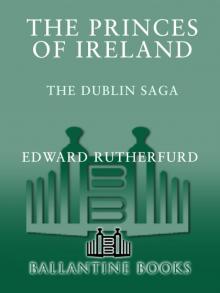 Princes of Ireland
Princes of Ireland New York
New York Sarum
Sarum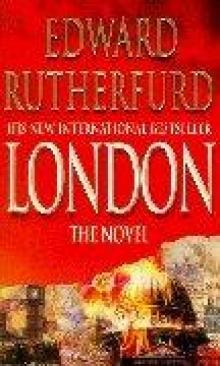 London
London Russka: The Novel of Russia
Russka: The Novel of Russia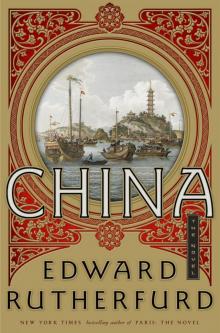 China
China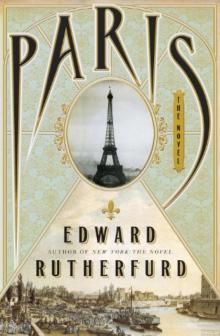 Paris
Paris The Forest
The Forest Russka
Russka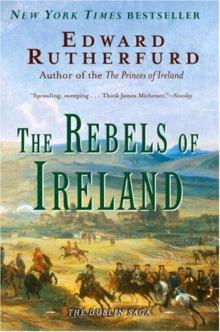 The Rebels of Ireland: The Dublin Saga
The Rebels of Ireland: The Dublin Saga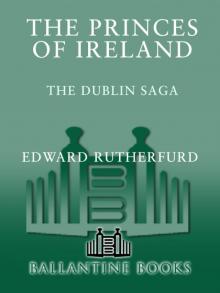 The Princes of Ireland
The Princes of Ireland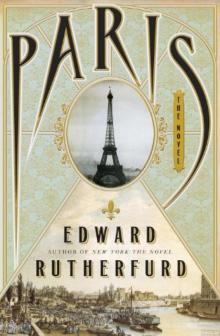 Paris: The Novel
Paris: The Novel